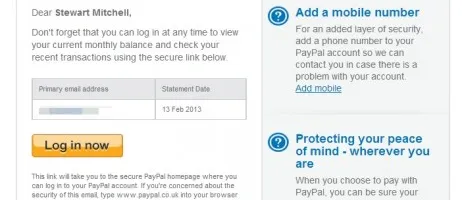How PayPal Is Keep Going With The Phishing Problem
Phishing has been a problem for years. Scammers send emails jam-packed with links to trick you into entering your passwords on fake websites that look like your bank or another service.
The one rule of thumb advised by banks and security experts is to not click through links in emails from companies without checking they are safe — and if in doubt, to head to the site directly to log in. This is because criminals are becoming less careless with grammar and more adept at designing mocked-up sites.
For instance, nationwide emphasizes that “We will never ask you to update account details” via email. Always keep in mind that banks will never email customers to request passwords or any other sensitive information by clicking a link and visiting a website, advises Action Fraud.

When we sent a sample email to PayPal’s communication team to see if it was real, they had to check it themselves because not even they could tell a fake from a real company email right away.
Yet PayPal, Facebook, and other businesses continue to ask for your participation in largely pointless communications. Consider the PayPal message that reads, “Your monthly statement is now available.” It is real, and the link does lead to the payment company’s website, but it is eerily similar to a phishing email. The use of a direct name rather than “Dear Valued Customer” is the only indicator of its authenticity.
The warning that you should visit the site immediately if you’re concerned is there, but it’s in the fine print.
When we sent a sample email to PayPal’s communication team to see if it was real, they had to check it themselves because not even they could tell a fake from a real company email right away.
Companies must stay in touch with their customers, but by doing so, they encourage unwary or careless people to believe that legitimate businesses really do send emails asking you to log into your account via links. This introduces uncertainty where there shouldn’t be any. Additionally, it undermines the advice of security professionals who urge against ever clicking links or entering passwords.
It makes life easier for phishers if PayPal and Facebook continue to send out such requests on a weekly or monthly basis by teaching users to login via email links. PayPal needs to make more of an effort to prevent it because it breeds the kind of complacent consumer apathy that criminals love to prey upon.
Related Articles
- How to Create And Verify Your PayPal Account
- How to Use PayPal.Me To Receive Payments Online
- How to Use PayPal Without a Credit card
- Can I Send Money From PayPal To Cash App?
- PayPal vs Venmo: Key Differences
ad


Comments are closed.